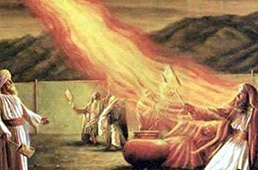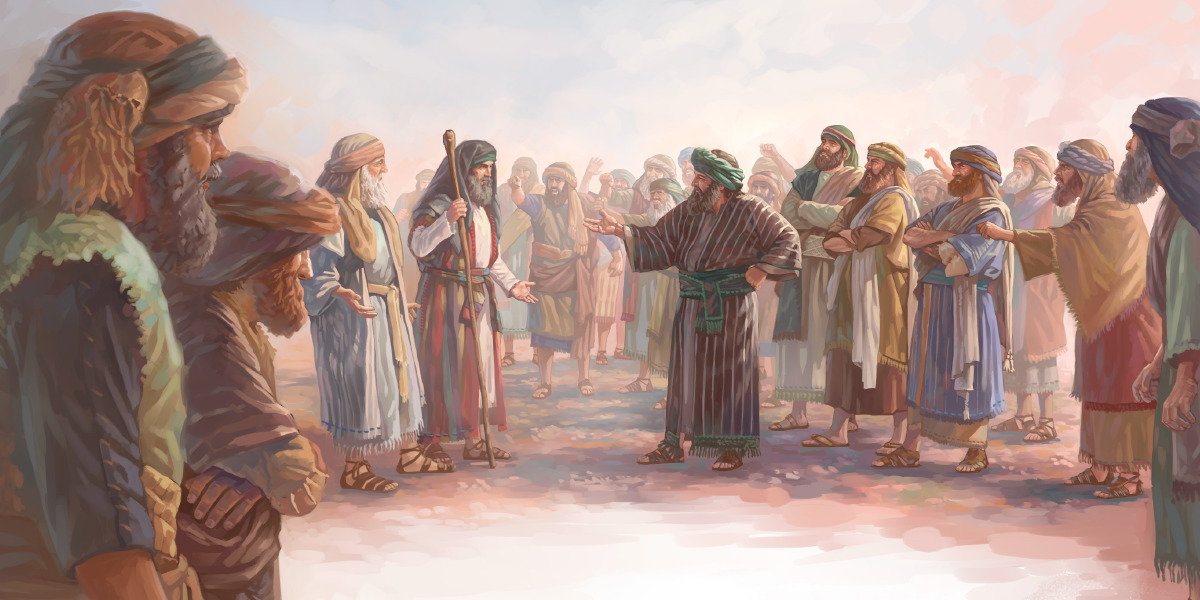
Wicked or Holy?

Shalom,
In addition to our one on one courses, we will soon start offering “Power Hebrew” group programs in our Israeli branches as well as for those who participate in our Guided Distance Learning programs.
Find out more on our site: www.ulpanor.com
—————————————————————————–
This week’s Torah portion “Korah” tells us about the rebellion of Korah against Moses and Aaron.
Korah was jealous of the fact that Aaron had been chosen as High Priest.
Furthermore, his cousin Elitzafan had been chosen as head of the Levite family of Kehat, to which Korah belonged, and Korah felt this position was rightfully his.
These personal aspirations led Korah to start a rebellion. Accompanied by Dathan and Abiram, he rallied an additional 250 community leaders to his cause.
They confronted Moses and Aaron and claimed that he had appointed his brother as High Priest on his own accord, without being instructed to do so by G‑d. They further demanded that they all be allowed to serve as High Priests.
Thus, by tradition, Korah is considered to be a wicked, ego-driven, demagogue who wanted to be appointed as a high priest instead of Aaron and out of jealousy staged a full-blown revolt.
However, the great Hasidic sage Rabbi Menaḥem Mendel of Kotzk bestowed on Korah the title “Our Holy Grandfather” and this title was not bestowed on a patriarch, Moses, Aaron or King David, but, of all people, on Korah.
The question is, what virtue did the Kotzker Rebbe see in Korah that caused him to relate to him as a “Our Holy Grandfather”?
What could bridge the gap between the traditional approach to Korah and the one of the Kotzker?
Maybe another Hasidic master – the “Ishbitzer Rebbe” can come to help.
Korah’s claim was:
“The entire congregation is holy, and God is in their midst; why then do you lift yourselves up above the congregation of the Lord.” (Num 16:3).
Korah makes the claim that there is no hierarchy in Israel where one individual ought to be set higher than his fellow man, for God is in the midst of the entire congregation.
That is to say that G-d dwells within everyone equally, as it is written in the midrash:
עָתִיד הַקָּדוֹשׁ בָּרוּך הוּא לִהְיוֹת ראשׁ חוּלָה לַצַּדִּיקִים לֶעָתִיד לָבוֹא
“In the future, the Holy One Blessed Be He will make a dance for all the righteous.”
“Dance” refers to a circle, in which no one is closer [to the center] than his fellow man.
In Proverbs 20:26 it says:
מְזָרֶה רְשָׁעִים, מֶלֶךְ חָכָם; וַיָּשֶׁב עֲלֵיהֶם אוֹפָן
A wise king scatters the wicked, and turns the wheel over them.
In our Torah portion (Numbers 17:2) which is the conclusion of the Korah episode it says:
אֱמֹר אֶל-אֶלְעָזָר בֶּן-אַהֲרֹן הַכֹּהֵן, וְיָרֵם אֶת-הַמַּחְתֹּת מִבֵּין הַשְּׂרֵפָה, וְאֶת-הָאֵשׁ, זְרֵה-הָלְאָה: כִּי, קָדֵשׁוּ
אֵת מַחְתּוֹת הַחַטָּאִים הָאֵלֶּה בְּנַפְשֹׁתָם, וְעָשׂוּ אֹתָם רִקֻּעֵי פַחִים צִפּוּי לַמִּזְבֵּחַ–כִּי-הִקְרִיבֻם לִפְנֵי-יְהוָה, וַיִּקְדָּשׁוּ; וְיִהְיוּ לְאוֹת, לִבְנֵי יִשְׂרָאֵל
And the LORD spoke to Moshe, saying: ‘Speak to Elazar the son of Aharon the Kohen, and have him lift up the fire-pans from the inferno, while you scatter the fire yonder.
For they were sanctified, the fire-pans of these sinners [who paid] with their lives, and make them into hammered sheets to overlay the altar, for they were offered before the LORD and became holy.
The Ishbitzer Rebbe notes that both verses make use of the verb to scatter – לזרות (LIZROT)
The root is – זרה
The reading of the second verse implies the reading of the first.
The wise King (Solomon) of Proverb scatters the fire of Korah not for its wickedness, but because it has become sanctified due to Korah’s “equality of holiness” approach.
That fire, scattered upon the earth, will smolder until the End of Days.
Then it will once again blaze fulfilling vision of equality in terms of the equal holiness of the people of Israel, Korah has offered us.
And now a little bit of Hebrew:
There are several expressions with the root זרה that are worthy of noting:
זורה מלח על הפצעים
Rub salt into wounds
זורה חול בעניים
Throw dust in one’s eyes
The rebellious act of Korah and the others who joined him is referred as:
מחלוקת קורח ועדתו
The dispute of Korah and his company
- Dispute, discourse – מַחֲלוֹקֶת – (MAHLOKET) comes from the root חלק – part.
Discourse sets people apart from each other…
Wishing you a Shabbat of harmony and togetherness.
Shabbat Shalom
Yoel & Orly
Many ask us for a permission to redistribute our newsletters. By all means, please do feel free to forward this newsletter to anyone you wish!
Access the archive of our previous posts at:
https://www.ulpanor.com/category/blog/
Subscribe to our newsletters on our website at the bottom of the home page:











